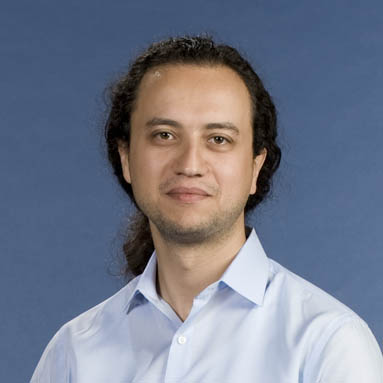Join the Most Comprehensive Robotics Engineering Master's Program in the U.S.
As one of the fastest growing and most exciting engineering disciplines, robotics engineering is transforming whole industries—including automation, manufacturing, healthcare, transportation, energy, agriculture, service, search and rescue, material handling, education, and security and national defense.
And WPI is home to the MS program for Robotics Engineering.
- Be part of our pioneering robotics engineering master’s program—the first of its kind in the world
- Engage in project-based, experiential learning that prepares you for your next role or promotion
- Work with state-of-the-art robotics technology—and master skills today you can use tomorrow in your career
- Collaborate with vibrant, diverse, award-winning faculty
- Explore interdisciplinary opportunities in computer science, mechanical engineering, electrical and computer engineering, biomedical engineering, game design, aerospace, and more

This program is also available online
Learn moreMS in Robotics Engineering: Career Outcomes
What does a career in Robotics Engineering look like? Browse WPI and national date to learn about companies who have hired WPI graduates, average salaries, job outlook, and more.
Curriculum
With some of the most widely respected faculty in the nation and advanced robotics courses, graduate students turn theory into practice as they make robots, create software to operate them, understand how robots communicate, and study the ethical implications of using robots in a human world.
The foundation of robotics course work is supplemented by forward-thinking engineering course options in project management or entrepreneurship and innovation. You’ll have the freedom to design your own capstone work or thesis in whatever area interests you the most, and you’ll work closely with faculty to make sure it advances your study.
Similar Majors
Refer a Friend
Do you have a friend, colleague, or family member who might be interested in a WPI graduate program? Click below to tell them about our programs.
Master's in Robotics Research
Robotics research at WPI is ongoing and limitless. With engaged and accessible faculty and diverse research projects and teams, the master's in robotics engineering offers varied opportunities to explore your specialty and make industry connections.
While working towards an MS in robotics engineering, you’ll work alongside faculty and peers on leading-edge research and discover all the potential that robotics holds. Whether you want to explore robotic manipulation, voice recognition, biomechanics and robots, wearable robots, or robotic musical instruments, you’ll find your research niche here.

The robotics curriculum is purposefully varied. The industry is multilayered, so students take classes that have a business, systems engineering, or entrepreneurial approach.

As a robotics graduate student, you’ll work side-by-side with faculty on research that pushes the boundaries of what seems possible—whether it’s developing robotic medical instruments or fine-tuning the smallest, multi-robot swarm robotics.

WPI has a long history as a pioneer in robotics engineering education, giving it a depth and breadth of knowledge. IT was the first university to offer BS through PhD degrees in robotics, and its comprehensive curriculum reflects that deep experience.

As a multidisciplinary field, robotics researchers collaborate to extend their impact.

Robotics impacts humanity in levels as varied as manufacturing to the most delicate surgery. A degree in robotics gives you plentiful job opportunities.

You’ll develop varied skills working within the robotics field. Depending on goals and interests, students can write the software to operate robots, build robots, or explore the ethical implications of robots in a complex human world.

New England is considered the global epicenter for the robotics industry. Opportunities to contribute to important advances in the field exist in nearby academia, established organizations and industries, and start-ups.

The robotics curriculum is purposefully varied. The industry is multilayered, so students take classes that have a business, systems engineering, or entrepreneurial approach.

As a robotics graduate student, you’ll work side-by-side with faculty on research that pushes the boundaries of what seems possible—whether it’s developing robotic medical instruments or fine-tuning the smallest, multi-robot swarm robotics.

WPI has a long history as a pioneer in robotics engineering education, giving it a depth and breadth of knowledge. IT was the first university to offer BS through PhD degrees in robotics, and its comprehensive curriculum reflects that deep experience.

As a multidisciplinary field, robotics researchers collaborate to extend their impact.

Robotics impacts humanity in levels as varied as manufacturing to the most delicate surgery. A degree in robotics gives you plentiful job opportunities.

You’ll develop varied skills working within the robotics field. Depending on goals and interests, students can write the software to operate robots, build robots, or explore the ethical implications of robots in a complex human world.

New England is considered the global epicenter for the robotics industry. Opportunities to contribute to important advances in the field exist in nearby academia, established organizations and industries, and start-ups.

The robotics curriculum is purposefully varied. The industry is multilayered, so students take classes that have a business, systems engineering, or entrepreneurial approach.
Several on-campus, high-tech robotics labs allow robotics master's students the space and equipment needed for research, experiments, and discovery. Whether it’s in the Autonomous Robotics Collaboration (ARC) Lab or the Humanoid Robotics Lab, there’s a place for MS in robotics students to create and experiment.
Graduate Studies Series.
Team members from Graduate & Professional Studies host quick and convenient webinars designed to highlight popular topics when starting grad school. Take a deep dive into specific areas of interest such as how to secure funding, how to ace your application, an overview of student services, and more!
Ready to Pursue a Master's Degree in Robotics?
If you’re ready to work on breakthrough discoveries and turn theory into practice as you construct robots, a master’s in robotics engineering is the degree for you. In our robotics master’s program, you will be surrounded by like-minded forward-thinking individuals who also have a passion for using robots in the human world. Browse our application requirements and submit an application today!
Maybe you’re ready to earn a doctorate degree? Elevate your career in robotics engineering with our robotics engineering PhD program. WPI offers one of the few robotics engineering PhD programs worldwide.
Pursue a Master’s Degree in Robotics Online
Did you know that WPI is one of the first in the nation to offer robotics engineering online? With our master’s in robotics engineering online, courses are delivered live through virtual sessions enabling you to study on your time.
Gain a Solid Foundation with a Robotics Engineering Graduate Certificate
Looking to gain an understanding of robotics engineering as you progress to earning your master of science? Our Robotics Engineering Graduate Certificate provides students a solid foundation of robotic systems, mechanical engineering, computer science, mathematics, and electrical and computer engineering in 15 course credits. Check out the required courses to fulfill the robotics engineering graduate certificate here.
Faculty Profiles

The focus of my research is designing innovative tools for swarm robotics. I am developing Buzz, a programming language specifically designed for real-world robot swarms. During my Ph.D., I have designed ARGoS, which is currently the fastest general-purpose robot simulator in the literature. Recent work focuses on human-swarm interaction and multi-robot learning. I am also working on swarm robotics solutions for disaster response scenarios, such as search-and-rescue and firefighting.

My research spans robotics, haptics, multi-modal perception, and artificial intelligence, at the intersection of computer science and engineering. There are two highly related themes in my robotics research: one is the focus on “contact sport”, i.e., the contact and interaction between a robot or a part/tool it holds and the environment, and the other is real-time adaptiveness of robots to uncertainty and uncertain changes in an environment based on perception.

An integral part of a rewarding academic career is being an educator. It is a wonderful opportunity to work with students and guide their development to fulfill their potential. I enjoy teaching the fundamentals of robotics engineering, science and technology as well as training students in advanced independent research. I aim to teach students about research-based thinking and problem solving, to give them a real career choice to determine their future in further research or the industry.

Berk's research primarily focuses on problems related to robotic manipulation, which is a key functionality largely missing from the current state of the art in robotics for unstructured environments, including homes, modern warehouses, and collaborative manufacturing stations. He develops multi-modal robotic manipulation strategies mainly focusing on the role of vision feedback for coping with uncertainties of unstructured environments.

My research interests are in the application of robotics and computer science to enhance medicine, and particularly surgery. What gets me out of bed in the morning is the prospect of helping doctors save lives and improve the quality of life of their patients. My students and I work side-by-side with clinical collaborators to create technology that presents a tangible clinical value – for instance, making an existing surgical procedure more accurate or enabling new procedures that are not feasible with current instrumentation.
Professor Fischer is the William Smith Dean's Professor and a faculty member in Robotics Engineering with a appointments in Mechanical Engineering and Biomedical Engineering at WPI. He received his PhD in Mechanical Engineering in 2008 from Johns Hopkins University, where he was part of the NSF Engineering Research Center for Computer Integrated Surgery. At WPI he has been an integral part of developing the Robotics Engineering program and teaches primarily junior-level and graduate courses in Robotics.

My research leverages control theory, formal methods, and machine learning to construct adaptive, provably correct cyber-physical systems with respect to complex specifications. The challenges I am currently interested in include: reactive robotic systems under partial information and modeling uncertainty, multi-robot coordination, optimal control of hybrid systems, and design of adaptive semi-autonomous systems.

The focus of my research is designing innovative tools for swarm robotics. I am developing Buzz, a programming language specifically designed for real-world robot swarms. During my Ph.D., I have designed ARGoS, which is currently the fastest general-purpose robot simulator in the literature. Recent work focuses on human-swarm interaction and multi-robot learning. I am also working on swarm robotics solutions for disaster response scenarios, such as search-and-rescue and firefighting.

My research spans robotics, haptics, multi-modal perception, and artificial intelligence, at the intersection of computer science and engineering. There are two highly related themes in my robotics research: one is the focus on “contact sport”, i.e., the contact and interaction between a robot or a part/tool it holds and the environment, and the other is real-time adaptiveness of robots to uncertainty and uncertain changes in an environment based on perception.

An integral part of a rewarding academic career is being an educator. It is a wonderful opportunity to work with students and guide their development to fulfill their potential. I enjoy teaching the fundamentals of robotics engineering, science and technology as well as training students in advanced independent research. I aim to teach students about research-based thinking and problem solving, to give them a real career choice to determine their future in further research or the industry.

Berk's research primarily focuses on problems related to robotic manipulation, which is a key functionality largely missing from the current state of the art in robotics for unstructured environments, including homes, modern warehouses, and collaborative manufacturing stations. He develops multi-modal robotic manipulation strategies mainly focusing on the role of vision feedback for coping with uncertainties of unstructured environments.

My research interests are in the application of robotics and computer science to enhance medicine, and particularly surgery. What gets me out of bed in the morning is the prospect of helping doctors save lives and improve the quality of life of their patients. My students and I work side-by-side with clinical collaborators to create technology that presents a tangible clinical value – for instance, making an existing surgical procedure more accurate or enabling new procedures that are not feasible with current instrumentation.
Professor Fischer is the William Smith Dean's Professor and a faculty member in Robotics Engineering with a appointments in Mechanical Engineering and Biomedical Engineering at WPI. He received his PhD in Mechanical Engineering in 2008 from Johns Hopkins University, where he was part of the NSF Engineering Research Center for Computer Integrated Surgery. At WPI he has been an integral part of developing the Robotics Engineering program and teaches primarily junior-level and graduate courses in Robotics.

My research leverages control theory, formal methods, and machine learning to construct adaptive, provably correct cyber-physical systems with respect to complex specifications. The challenges I am currently interested in include: reactive robotic systems under partial information and modeling uncertainty, multi-robot coordination, optimal control of hybrid systems, and design of adaptive semi-autonomous systems.

The focus of my research is designing innovative tools for swarm robotics. I am developing Buzz, a programming language specifically designed for real-world robot swarms. During my Ph.D., I have designed ARGoS, which is currently the fastest general-purpose robot simulator in the literature. Recent work focuses on human-swarm interaction and multi-robot learning. I am also working on swarm robotics solutions for disaster response scenarios, such as search-and-rescue and firefighting.
Have questions?
WPI's dedicated graduate student support team can help.

